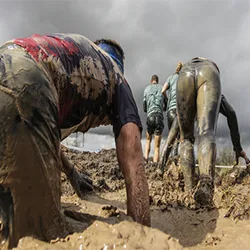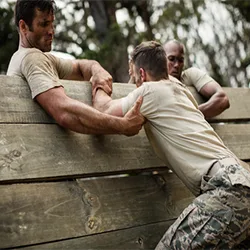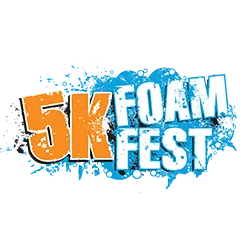Data obtained May 2018. Prices are subject to change and should be used only as a general guide.
Most obstacle courses require you to negotiate physical challenges by running, crawling and climbing. Participants are timed to see how long it takes them to complete the course, or they are challenged to complete the course as many times as they can in a set time frame. Obstacle courses can be individual or team events.
What will I face on these courses?
Some courses are extremely challenging with tough obstacles ranging from eight-foot climbing walls to barbed wire. Other courses, such as mud runs, feature obstacles that are tricky, but by no means hard. You also have a choice of courses that are just there for the fun factor, while others are suitable for families and young children.
How do I attend?
You usually have to pre-register or buy a ticket to attend. At the event, check in at the registration desk and get your numbered bib. You can then meet up with your team members if you’re competing with a team.
What’s the fun factor?
Throughout the event, you will be expected to deliver your best and give each obstacle a solid go as quickly as you can. Obstacle races are usually fun-focused with a social post-event vibe.
Options for kids and families
Obstacles courses are not just for adult superheros. Kids can participate as well. Plenty of courses offer a choice of challenges suited to kids of all fitness levels. Young children aged 4 to 11 will like the Tacker Attack 1k course run by Loveday 4x4 Adventure Park.
If you’re looking for fun for the whole family, Baldivis Fitness runs a mixed adult and kids course in WA called the XLR8 Family Fun Obstacle Course. At this course, kids and adults can take turns cheering each other on through tough patches.
Even furry family members can join the race. Check out the Muddy Paws Challenge hosted by Swan Valley Mudfest where even your dog can join in the mud run.
There are a couple of established classics in Australia that are proving popular year after year. These three favourites offer a great mix of challenges.
Tough Mudder
More about teamwork than individual performance, this 16-20km race runs through mud and an assortment of obstacles.
You can expect a mix of climbing and crawling obstacles, with titles like the Birth Canal and Leap of Faith. Your performance is not timed and there is no winner, but you can qualify for a performance finish T-shirt.
Tough Mudder also comes in Toughest Mudder and Mudder Half variants, which amp up the challenge or offer a shorter course respectively.
The race is called Tough Mudder for good reason. You need to be reasonably fit to take part, but you don’t need to be extremely fit. You can enrol as a single participant, but some obstacles require teamwork.
5k Foam Fest
Foam has clearly been the ingredient missing in obstacle courses, so three cheers to the inventors of the 5K Foam Fest for putting together this fun run. Expect obstacles but nothing too tough in what’s described as a “funcore” event. The foam’s the feature here with everything from a Foamy Start to the Chamber of Foam to test your patience for bubbles.
This 5km event features muddy hurdles as well, but it is mostly fun focused and appropriate for all ages.
What else do you expect from a course with 22 obstacles including the largest inflatable waterslide in the world? All in all, expect a fun day out that is great for families and team building rather than a tough physical challenge.
Spartan Race
Looking for a race that will push your performance as an individual? Look no further than Spartan Race, with its choice of three difficulty levels: Sprint, Super and Beast. Beginners are encouraged to start with a 7km, 20-obstacle Sprint, while only the extremely fit should consider the 21km, 40-obstacle Beast.
Racers take their fitness very seriously, and the organiser provides everything from fitness guides to nutrition guides to help you get ready.
There is an Elite World Series competitive grid too, so you have the opportunity to measure your fitness against the very best. Born in the mountains of Vermont, this race has life-changing potential for those who dare.
- Teams or individuals? Some races focus on the individual. You join as an individual participant, and your performance is measured as an individual. Other races require real teamwork, with obstacles that cannot be completed without assistance.
- Fitness level. Take an honest view of your own fitness level before you sign up. Some courses are extremely tough. Read up on the race and its requirements before you join. Consider intensive training before participating so that you are better prepared to complete the course.
- Goals for the day. What do you want to achieve? Is it about physical fitness and pushing your boundaries, or do you want to enjoy the atmosphere? Choose an easier course for a fun day out with mates. If you are looking to work an obstacle course into your fitness regime, pick a tough one.
- Location. Consider how far you want to travel to attend a course both before and after participating. A challenging course may not leave you in the mood to take a long drive home. An overnight stay before or after may be the answer.
- Group events. Attending as a family or on a team building day? Think about things like fitness levels and tolerance for mud and dirt. Your fellow team members may not share your preferences and abilities, so consider an easier or more flexible course if that is the case.
You have to know what you are in for before you start, so read up on the course and the experience of previous participants. This will give you an idea of how fit you need to be.
If a course organiser suggests that you need to be very fit to complete the course, take their suggestion seriously and work on a pre-event training program.
Keep in mind that obstacle courses will stress parts of your body which your normal exercise routine may not. Climbing activities require a good grip, so add grip exercises to your training. Your upper body also needs to be in top shape so ensure you train your chest and back muscles too.
Wearing the right clothing is crucial. Pick tight-fitting clothes that won’t slow you down as you complete the obstacles. Cotton is not recommended for obstacle course racing as it retains water. Instead, you should pick fabrics that dry quickly.
Enclosed shoes are mandatory in most races. Trainers are a good choice, but you can’t use spikes. Expect to ruin whichever pair you bring, so your brand new trainers are not appropriate. Always check out the organiser’s recommendations, which can include elbow and knee pads as well as gloves.
For tough and muddy races, forget about hats and sunglasses, you will simply lose them along the way. Other races can benefit from sunglasses and a hat to protect you from extended sun exposure.
Finally, get into the right mindset. Challenging obstacle courses will strain you both mentally and physically. Treat any training you do beforehand as seriously as the race itself. Attending a fun race? Don’t over compete; just get into the mood to enjoy the day’s fun.
Obstacle courses can be big, expansive events including everything from the race itself through to live music, good food and other perks.
At a minimum, you can expect an organised race with attending personnel and help when you need it. Some form of refreshment is usually included too, including water stations dotted along the course.
You could also get some goodies, such as a completion T-shirt, medals for winners and a wrist band or lanyard. Next to the obstacle course, you could see a range of events like a live DJ and festive activities for non-participants as well as food and drink vendors.
Facilities depend on how extensive and challenging the event is. Organisers could arrange changing rooms and showers to clean up after the race. First-aid personnel may be in attendance too. Some races also feature stay-over facilities like onsite camping.
Your guide to 5 of Australia's favourite obstacle courses





